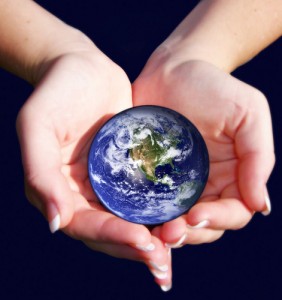
Editor’s Note: We are honored to publish the following guest post by Zoe Weil. Zoe is the President of the Institute for Humane Education(IHE) and author of Above All, Be Kind: Raising a Humane Child in Challenging Times and Most Good, Least Harm: A Simple Principle for a Better World and Meaningful Life.
Among some environmentalists, there is a strong anti-civilization movement and the belief that the only hope for a sustainable world entails a return to a veritable Stone Age, a time when humans had neither the capacity, the desire, nor the wherewithal to create havoc within ecosystems, cause the extinction of myriad species, and utterly despoil our environment.
Whenever I have seen or heard this position put forth as a viable solution to the situation in which we find ourselves in the 21st century, I’ve thought it both ludicrous and misanthropic: ludicrous because it simply will not happen that billions of people will willingly return to a pre-technological era, and misanthropic because such a return would necessitate the death of much of humanity.
But until I read the current issue of The Sun magazine and the interview with “environmental optimist” and founder of worldchanging.org, Alex Steffen, I’d never seen a critique of such a position so well articulated. Steffen argues that the return to a Stone Age way of life would cause catastrophic human suffering, saying:
We know that way of life can’t support a population in the billions, so trying to go back to it would require the death of most of the world’s people. Beyond that, I think it’s obvious that nature is now a wholly owned subsidiary of Humanity, Inc. We have the capacity to take it down with us if we choose, and people are put into desperate situations will do just that. There’s this sort of college-town anarchist idea that if we let it all fall apart, out of the ruins will come something clean and noncommercial and egalitarian and more in touch with nature, but that’s just crazy. Hungry people don’t think about the future. As my colleague Allan AtKisson says, a world of starving people will be a world without panda bears, dolphins, or rain forests. By the time we got back to the Stone Age, we wouldn’t have the same world we had during the Stone Age. We can’t go back; there’s no ‘back’ to go back to.
Steffen insists that it’s equally deluded to believe that technology will “magically find a way to let us continue living wasteful, suburban lives based on throwaway consumption.” To me, this means we need to find a way to move forward, and that will happen when we don’t romanticize the past as a perfect template for a viable future and we don’t cling to the present as an ideal to spread across the globe, but rather begin to envision a world in which we are all able to live joyful, healthy, meaningful lives which meet our physical and emotional needs peaceably and sustainably. Yes, this is indeed hard to imagine. For some, it may seem unimaginable. But what else should we do than make the effort to imagine such a world and put legs on our vision?
In the same interview, Steffen is asked, “How do you look at all these problems and stay optimistic?” He responds:
Optimism is a political act. Those who benefit from the status quo are perfectly happy for us to think nothing is going to get any better. In fact, these days, cynicism is obedience. What’s really radical is being willing to look right at the problems we face and still insist that we can solve them.
I don’t pretend to know how to solve all our problems or how to change the many systems (economic, political, energy, agricultural, legal, commercial, etc.) that perpetuate them. I do know, however, that there is one system whose transformation will lead to changes in all the other systems. That system is education. If we as a society redefine the purpose of schooling and provide all students with the knowledge, tools, and inspiration to themselves envision a sustainable and peaceful world, then these young people will bring that knowledge, those tools, and their enthusiasm into all the professions they enter, transforming each in turn.
While we don’t need to know all the answers, we need to believe that those answers are obtainable, both by us today, and by our children tomorrow. We must not abdicate our responsibility to harness our own creativity and critical thinking skills and to insist that our children’s curiosity, creativity and critical thinking capacities be cultivated and encouraged with the goal of a peaceful, sustainable world as their grail. This is the way forward.
the darkest hour is just before the dawn….check out Amy Goodman’s interviews with representatives of the worlds indigenous peoples at the recent climate summit in Bolivia (see Democracy Now)…it puts the efforts of Copenhagen to shame…